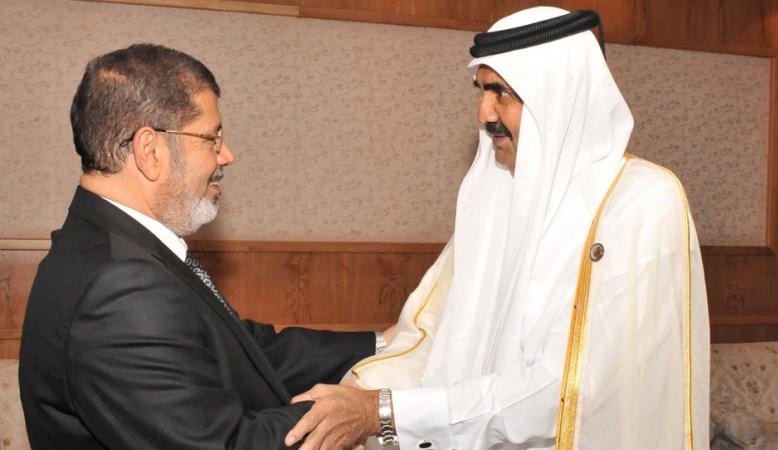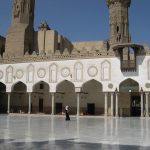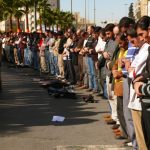by Graham E. Fuller
Speculation has run high over the past several years about what Qatar is up to in the Middle East. At first blanch its foreign policy seemingly contains a mass of contradiction: a Wahhabi state; good ties with Iran; hosting a major US airbase; support for the Muslim Brotherhood; support for armed revolutionary change in Libya, Yemen and Syria; good ties with Turkey; bad ties with Egypt; a solid monarchy yet the seat of the iconoclastic Al Jazeera satellite network—what’s going on here?
It may not be so mysterious if we consider a few key factors that may help the pieces to fall in place a bit more. Qatar enjoys a distinctly moderate form of Wahhabism as its state religion, putting it at odds with the extremely reactionary Saudi version. Qatar aspires to be “modern” in a way that few other monarchies do in the Gulf, except for Dubai. More notably, it appears to believe that Islamism of some sort will continue to be the guiding moral/ideological principle in Middle East governance for a long time to come. For this reason it prefers a more modern variant of Islamism, namely the Muslim Brotherhood which is largely non-violent (except for the Palestinian variant, Hamas, that is involved in a national liberation struggle); the Brotherhood also generally accepts the principle of democratic process in ways that so many other Islamists do not (and is therefore generally viewed as blasphemous and dangerous by Riyadh.) Qatar sees the Brotherhood in its various forms across the Muslim world as relatively progressive and representative of the wave of the future far more than the Saudis or other Gulf states and religious establishments that indeed reject democratic process and popular government. In this way Qatar is sharply at odds with the reactionary policies of Egypt and the other Gulf monarchies who fear the revolutionary implications behind Brotherhood politics.
Perhaps the map reveals Qatar’s most important reality: it is a tiny appendage on the massive body of the Saudi-dominated Arabian peninsula. Riyadh could snap it up militarily in short order. If Qatar is to protect itself from some kind of Saudi annexation or “manifest destiny”—not a far-fetched threat judging by several Saudi military sweeps to the Gulf waters in the past—then it needs to be firmly on the world map with a powerful and vivid international profile that cannot be easily ignored should its existence be threatened in the future.
Qatar is close to Turkey as well, on both economic and ideological grounds. The very moderate Islamic government of Turkey also sees the Brotherhood as a force to be encouraged for political progress in the region. The reality is that secular liberalism shows little promise of mass support in the region for quite some time to come whereas slowly evolving forms of Islamic governance do. The Brotherhood represents a credible transition process and perhaps a way to combine Islamic values with some democratic processes, progress, and free enterprise. Of course, the Brotherhood is still feeling its way on a long learning curve, but it is way ahead of almost any other Islamist movement in the Arab world.
Qatar is very likely to remain a maverick in the region for some time to come, angering the Saudis and its neighbors in the process. There are indeed some contradictions in its policies, but while the Saudi future would seem bound up in sclerotic and reactionary leadership and a defensive, retrogressive vision, Qatar’s young and nimble leadership offers a notable contrast that looks with some greater openness and confidence to the future.
Qatar is of course in no hurry to adopt broad democratic process at home, but its bold, even radical approaches to regional policies and its sponsorship of the iconoclastic Al Jazeera might well help sustain its progressive image for many more years, especially compared to most other Gulf states. (For more detail on this fascinating maverick state, see Chapter 15 in my new book, “Turkey and the Arab Spring.”)
Graham E. Fuller is a former vice chairman of the CIA’s National Intelligence Council. His latest book is Turkey and the Arab Spring: Leadership in the Middle East. This article was first published on Graham E. Fuller’s website and was reprinted here with permission. Copyright Graham E. Fuller.






I think Graham Fuller is confused.
In Britain, the US and other Western countries, concerns are being raised about radicalised young men and women travelling to Syria and Iraq to join the armed militias of the Islamic State.
How are they managing to travel there? Answer: through Turkey.
Graham Fuller claims Turkey is a ‘very moderate Islamic government’.
How can he make this assertion when it is Turkey which has supported Islamic extremism?
Turkey could stop the radicalised young people from crossing its borders into Syria.
However, it chooses not to. Is that the action of a so-called ‘moderate’ government?
The problem with a lot of the analysis being offered is one of projection.
People like Graham Fuller are projecting their interpretations onto the Syria-Iraq situation.
What he needs to do is talk less and listen more.
Listen more and take careful note of the actual actions of regimes like those in Turkey.
What ever Turkey may have been in the past, it is no longer the same today.
It is correct that Qatar follows a milder wahhabi ideology and it is correct to say that a ‘tamed’ and pacific Moslem Brotherhood would be a better choice than a secular or an extremist dictatorship. That’s the concept Qatar and Turkey sold to the USA to justify their interference and the support of the ‘Arab spring’ in Tunisia, Libya, Syria, and Egypt. The USA and the West , desperate for a long term solution that would also protect Israel went along.
Yet the short time the Moslem Brotherhood were in power even with the money and the advices of Qatar and Turkey, they showed that they were unable to protect minorities and were on the road to become another authoritarian and violent religious regime.
Qatar as a tiny country with half a million population and lots lots of money, has ‘la folie des grandeurs’. After buying off Paris and London important landmarks, they though that together with highly industrialized and ‘moderate’ Sunni Turkey they could grab underdeveloped Arab countries ( Libya, Syria, Egypt, Gaza) by putting them under the rule of the Moslem Brotherhood and then use them to develop them as huge business opportunity that would benefit economically Turkey and Qatar.
The failure of the Syrian take over by the Moslem Brotherhood-lead Syrian opposition followed by the failure of the take over of Egypt by Morsi’s Moslem Brotherhood has ruined Turkey and Qatar plans.
The emergence of ISIS in Syria was first seen favorably by Turkey, Qatar and Saudi Arabia as a force against the Syrian army and they poured money to boost them.
When ISIS attacked Iraq, Turkey and Qatar immediately stopped the funding as many Western media, while silent when ISIS was in Syria, started to accuse them of helping and supporting the fighters .
To cover up their past involvement,Turkey and Qatar immediately switched to become ‘mediators’. Yet, the deteriorated relation with ISIS has prevented them from freeing hostages kept by ISIS ( 49 turkish diplomats and Lebanese soldiers)
They were able to ‘liberate’ with large media coverage the hostages kept by al Nusra which is the military arm of their ally the Moslem Brotherhood.
Turkey and Qatar now are reviewing their plans after the collapse of their plan A.
They are under pressure from the USA to actively fight ISIS.
Turkey, under the presidency of Erdogan’ is going through internal social and political transformation. It does not have any desire to enter in military actions that are unpopular and would affect negatively the economy.
Thus Turkey’s response is that the US should boost the “Syrian rebels” to fight ISIS and the Syrian army. In view of the poor state of this group, the suggestion look absurd, but Turkey will stick on it as long as possible. 2015 is an election year, any failure or mishaps of the present majority party in Turkey could be fatal.
Erdogan is throwing all the blames and responsiblity for ISIS existence on the international community ” You made it, you unmake it”:
Qatar is in a crossroad. They have been seriously damaged by the fall of Moslem Brotherhood in Egypt and are trying to put the pieces together for a new approach. Their ambition is the same, but now Egypt is out of reach. They are left with Libya and Syria. In Libya their allies have just been bombed by the UAE and in Syria their allied Al Nusra and the Free Syrian army are taking a beating from the Syrians army and ISIS.
They have made themselves many enemies in the region. They are ostracized by the other Gulf countries and under heavy pressure to renounce to their support of the Moslem Brothehood. Egypt does not hide its hate for Qatar and in the case of Gaza, it has done everything it could to steal the show as Qatar was posing as a ‘mediator’ .
Will Qatar change their course, renounce to their ambitions on the Middle eastern countries? How would they change their plans is yet unknown.
You are leaving out Graham the 2000 Gorilla behind it all, Washington. None of the Gulf States are truly independent. They are all a part of Empire, albeit only on its third tier. All can go through regime change very easily should Washington so want. Qatar even more so than the others.
Qatar is a tiny “nation” of 1.8 million people and it is the home of The Al Udeid Air Base. That like the US bases that are going to go into the Philippines belongs to Qatar in name only.
Perhaps the Americans allow them to put in their janitorial staff and send some of the kids from the Royal Families for military training. In reality the base is home to the headquarters of United States Central Command (USCC) and United State Air Force Central Command (USAF).
In this country whose population is that of maybe Brooklyn, New York with a tiny group of Royals running it, regime change for Washington is something you can do overnight, virtually bloodlessly.
So anyone who thinks that the Al Thani family in Qatar, (from which the Emir (king) spawns)) can do whatever it wants, even against Empire’s Geo Political interests is taking something very strong, such as the mind altering drug of Empire propaganda media.
In reality when Obama was first elected he actually did have some of his own agenda and part of it was support for the Muslim Brotherhood in Cairo, for many of the reasons that you give Graham in your fine article.
But this still young presidents wishes were vetoed by the Egyptian military class who felt betrayed by him and backed by Suadi money and the willingness of the Russians to provide arms to Cairo they created the counter revolution.
While the Saudis were allowed to get away with bucking the interests of Obama on this one that was because many if not most analysts within the state department agreed with them about the Egyptian military being the best asset for the US in Cairo, especially since the Brotherhood was seen as a potential existential threat to Washington’s de facto little brother Israel.
But the Saudis will in no way be allowed to attack Qatar, which is very useful for Washington to finance operations that Riyadh does not want to pay for, like Al Shabab for example in Somalia.